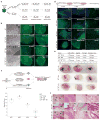Targeted disruption of DNMT1, DNMT3A and DNMT3B in human embryonic stem cells
- PMID: 25822089
- PMCID: PMC4414868
- DOI: 10.1038/ng.3258
Targeted disruption of DNMT1, DNMT3A and DNMT3B in human embryonic stem cells
Abstract
DNA methylation is a key epigenetic modification involved in regulating gene expression and maintaining genomic integrity. Here we inactivated all three catalytically active DNA methyltransferases (DNMTs) in human embryonic stem cells (ESCs) using CRISPR/Cas9 genome editing to further investigate the roles and genomic targets of these enzymes. Disruption of DNMT3A or DNMT3B individually as well as of both enzymes in tandem results in viable, pluripotent cell lines with distinct effects on the DNA methylation landscape, as assessed by whole-genome bisulfite sequencing. Surprisingly, in contrast to findings in mouse, deletion of DNMT1 resulted in rapid cell death in human ESCs. To overcome this immediate lethality, we generated a doxycycline-responsive tTA-DNMT1* rescue line and readily obtained homozygous DNMT1-mutant lines. However, doxycycline-mediated repression of exogenous DNMT1* initiates rapid, global loss of DNA methylation, followed by extensive cell death. Our data provide a comprehensive characterization of DNMT-mutant ESCs, including single-base genome-wide maps of the targets of these enzymes.
Figures







Comment in
-
Of Mice and Man: Differential DNMT Dependence in Mammalian ESCs.Cell Stem Cell. 2015 May 7;16(5):459-60. doi: 10.1016/j.stem.2015.04.009. Cell Stem Cell. 2015. PMID: 25957900
References
-
- Bird A. DNA methylation patterns and epigenetic memory. Genes Dev. 2002;16:6–21. - PubMed
-
- Li E, Bestor TH, Jaenisch R. Targeted mutation of the DNA methyltransferase gene results in embryonic lethality. Cell. 1992;69:915–26. - PubMed
-
- Okano M, Bell DW, Haber DA, Li E. DNA methyltransferases Dnmt3a and Dnmt3b are essential for de novo methylation and mammalian development. Cell. 1999;99:247–57. - PubMed
-
- Jin B, et al. DNA methyltransferase 3B (DNMT3B) mutations in ICF syndrome lead to altered epigenetic modifications and aberrant expression of genes regulating development, neurogenesis and immune function. Hum Mol Genet. 2008;17:690–709. - PubMed
Publication types
MeSH terms
Substances
Associated data
- Actions
Grants and funding
LinkOut - more resources
Full Text Sources
Other Literature Sources
Molecular Biology Databases
Research Materials

